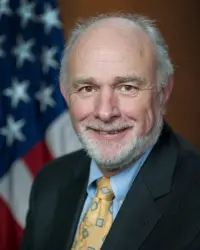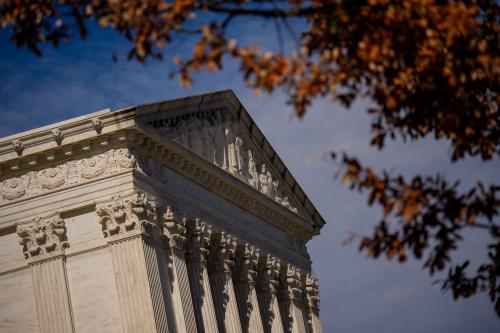TechTank, a biweekly podcast from the Center for Technology Innovation at Brookings, explores today’s most consequential technology issues. Moderators Nicol Turner Lee and Darrell West speak with experts and policymakers to share data, ideas, and policy solutions that address the challenges of our digital world.
Several major tech companies are facing legal challenges from antitrust enforcers at the state and federal level. While allegations vary by platform, there is a common theme: Each company has monopolized their respective markets and unlawfully maintained dominance, stifling competition.
As enforcers from the Federal Trade Commission (FTC) and the Department of Justice (DOJ) crack down on these companies, questions remain about what meaningful remedies will look like if the courts ultimately find unlawful monopolization. The recent rulings from the DOJ found that Google unlawfully monopolized search and advertising technologies. The court is now in the process of determining what proper redress might entail, a consequential decision set to shape the future of digital competition.
In this episode of the TechTank Podcast, guest host Bill Baer is joined by Rebecca Slaughter, former Federal Trade Commission commissioner, and Doha Mekki, former acting assistant attorney general in the Justice Department’s Antitrust Division, to discuss these recent actions and potential remedies.
Listen to the episode and subscribe to the TechTank Podcast on Apple, Spotify, or Acast.
Transcript
CO-HOST NICOL TURNER LEE [00:00:00] You’re listening to Tech Tank, a bi-weekly podcast from the Brookings Institution, exploring the most consequential technology issues of our time. From racial bias and algorithms to the future of work, Tech Tank takes big ideas and makes them accessible.
GUEST HOST BILL BAER [00:00:26] And welcome to the Brookings Tech Tank podcast. I am Bill Baer, your host today. I’m a visiting fellow at Brookings and part of the Brooking Center for Technology Innovation. Let me give you a little background on today’s topic. Antitrust enforcers at both the state and the federal level are pursuing unprecedented challenges to the dominant technology platforms. Note too that these are challenges that both The Trump administration in its first iteration and in its second iteration, in addition to the Biden administration, are supporting. Here are just a few of the challenges to the dominant tech platforms that are in litigation right now. Google is fighting separate Department of Justice challenges to its search engine monopoly and separately to its control over ad technology. Also known as Metta, is confronting FTC allegations that have monopolized social media. There’s a trial on liability that has just concluded the evidence phase, and there’ll be oral argument on that shortly. Down the road, Amazon faces separate FTC allegation that it is stifling competition for online purchases. Also down the road Apple stands accused by DOJ of engaging in various tax Dick is designed to further entrench its dominant position in mobile phones by, among other things, forcing app developers to exclusively offer apps through the Apple App Store. Specific allegations vary from tech platform to tech platform, the common theme is that these companies are monopolists in their respective space and have unlawfully maintained those dominant positions by unacceptable behavior. Basically, the enforcers at the Federal Trade Commission and at the Justice Department, with the enthusiastic support of many state attorneys general, are saying, you climbed ladder of success. And now you’re greasing the ladder so no one else can. Today, we want to focus on this question. If a court finds, as two courts have already done with respect to Google, if it finds unlawful monopolization, what can they do to remedy it? I’m reminded of that old saying about the dog that keeps chasing the car. What happens? What happens if the dog actually catches it? Now, fortunately for this podcast, we can talk about the two courts that have already ruled that Google was indeed a monopolist, and those two courts are in the midst of citing what they can and should do to address Google’s unlawful monopolies in both search and in ad technology. Now, even more fortunately, we have two experienced antitrust government officials that were involved in bringing some of these monopolization charges against the dominant tech platforms. Let me first welcome Becca Slaughter. Who has served as an FTC commissioner since 2018, and who is now challenging, along with her fellow Democrat, Alvaro Bedoya, President Trump’s effort to remove both from the FTC earlier this year. Becca is leading the cases, along with their FTC against Facebook and Amazon. Hey Becca.
GUEST BECCA SLAUGHTER [00:04:05] Hi Bill, thanks for having me.
GUEST HOST BILL BAER [00:04:09] We are also honored to have Doha Mekki, who served until late last year as the principal deputy assistant attorney general to Jonathan Cantor, then the head of the antitrust division in the Biden administration. Doha knows more than little about the two thus far successful DOJ challenges to Google search and to Google’s alleged dominance of ad technology. Hey Doha, glad you could join us.
GUEST DOHA MEKKI [00:04:38] Thanks for having me.
GUEST HOST BILL BAER [00:04:41] Today, we’re gonna focus on remedies in the two cases pending against Google. Why? Well, in both cases, a district court judge, Judge Mehta in the Google search case being tried here in the District of Columbia, and Judge Brinkema in the Guglaab case across the river in Northern Virginia have already decided that Google was a monopolist and had abused its monopoly power to squelch competition. Before we get into the details of possible remedies in those two cases though, let’s set the stage. There has been an ongoing debate in recent years. Whether we should pursue conduct remedies, conduct remedies in antitrust cases. In other words, stop doing this or promise to start doing that versus what we refer to as structural remedies. Divest all or part of a business or commit to royalty-free licensing of EP. The government has tended to favor structural relief in most cases, and the defendants not surprisingly take the opposite approach. Help us, Becca, if I can start with you, to understand this debate, structural versus conduct relief.
GUEST BECCA SLAUGHTER [00:06:03] Sure. And this is, as you said, a hot debate in geeky antitrust circles. And it is a really interesting one. What’s the right way to deal with a case where you have a law violation? I think an important thing to talk about to start with when we’re talking about remedies is what does the word remedy mean? Remedy means fix, right? Will it fix the problem? If a remedy is not in fact remedial if it doesn’t fix the problem. Then it isn’t a remedy at all. So I think that’s an important principle to start with. And when we say, well, it fixed the problem, I think the buried in that question is, will it work to fix the problem? Will remedy be effective in fixing the problem. And I break that into two buckets for myself. One is, will it undo whatever harm Will it effectively undo whatever harm was caused by the anti-competitive conduct in the first place? And second, will it work in the sense of will it be administrable? Can it actually be managed going forward? And that on both of those questions, I think is where some of the debate around structural versus conduct or behavioral remedies can break down. If one of The concerns about administrability is having ongoing government engagement monitoring how a business operates. That can be very challenging both to the business and to the government. It can be labor intensive for government monitors and it can be easy to work around. The ability of the monitors of the case to effectively see what conduct is happening, whether any of Beijing is. To proposed remedies is being successful, that can be really, really challenging. Structural relief in a lot of cases is much cleaner and it allows the free market to go back in and operate competitively, which is what, as antitrust enforcers, we wanted to have happen in the first place, right? We would like the market to be operating competitively independently without government steering it in one way or the other. And structural relief can often be a much more effective way to get there. And the last point I’ll make that sort of summarizes that is I’ve always found a little mystifying some of the debate around structural or behavioral remedies to the extent that in some circles, structural remedies is seen as a more radical sort of maybe interventionist approach and behavioral or conduct remedies is scene is. More of a small C conservative approach. And I think that that has it absolutely backwards to the extent that a conservative, small C, conservative approach would have less government engagement than structural remedies should be more preferable as opposed to behavioral remedies, which involve ongoing government. Involvement in the operation of businesses. So that’s sort of how I think about them from a high level
GUEST HOST BILL BAER [00:09:18] Well, let’s hear from Doha, but particularly Doha. You know, one example of the limitations of behavioral remedies is the acquisition that was approved some years ago by Live Nation of Ticketmaster. And, and it was approved with conditions, but the conditions basically said Live Nation can’t do what is profit maximizing, they promised not to engage in certain behaviors. With regard to tying purchase of tickets to the forum where you are. But it’s turned out that at least twice the government has to come back in and said you’re not doing it what you promised to do. And it may well be the profit motive overshadows the commitment to do the right thing.
GUEST DOHA MEKKI [00:10:06] So I think that’s exactly right. I should say, I think about the sort of landscape of potential remedies in much the same way as in commission or slaughter, right? So you’re thinking about behavioral remedies, the sort that thou shalt not do, the injunctions, affirmative and negative obligations, and then divestitures or sort of breakups or like the sale of assets or parts of the business. It should surprise no one that an adjudicated monopolist and in the case of Google, a twice adjudicated monopolist I’m sorry, three times a dedicated monopolist, counting the private case, would want to keep the assets that helped create or maintain a monopoly. But I think you’re exactly right, Bill, that we accept in this country, and in fact think it’s good, that corporations are profit maximizing. They have obligations to their shareholders to maximize value. And so enforcers run into really big problems when we say, or when we have said in the past, know, we are going to trust you to keep the offending assets, right, with which you created or maintained your monopoly power, but expect you to do something other than what is profit maximizing. I had a former boss who used to sort of joke that, you know, price fixing and monopolization, all of this illegal behavior is actually great for business, and every company would be doing it, but for the fact that it’s illegal, right? So it’s been the for more than a century in this country. That competition is the paramount rule of trade. And so I think you pointed out Ticketmaster Live Nation and other examples of cases that really grow up in the merger context, where the agencies have sort of permitted a tie-up to go forward and impose these kinds of affirmative and negative behavioral obligations. Years down the line have really been burned to find that corporations not only didn’t stop doing the offending conduct but maybe have used assets that may have been obtained that bolstered that bad conduct in new ways and sort of in ways that created new problems. And so really hats to the FTC, which did a remedy study many years ago that was kind of designed to suss out what was really going on with merger remedies. And I think enforcers that are now bringing and winning these monopolization cases are really better edified and better prepared to meet the moment because of that learning that we did over the last 20 years or so about what kinds of remedies work and which ones are really rather ineffectual and risk more harm to the public.
GUEST HOST BILL BAER [00:12:54] You mentioned over 100 years of monopolization enforcement. Sherman Act, Section 2, dates to 1890. What have we learned in terms of litigated monopolization cases and settled monopolization cases over that long history? There haven’t been all that many Section 2 monopolization case brought in recent years, but what does judicial precedent and then settlement? Tell us is an appropriate way to go, as Becca said a minute ago, when you have a finding of liability. Doha, you want to start and then we’ll go to Becca?
GUEST DOHA MEKKI [00:13:33] Sure. So one big overarching sort of story to inform how I really became reacquainted with this law. I’m a huge antitrust dork. I love reading old cases, I love recent cases, but really I find a lot of inspiration and the wisdom of the Supreme Court and legislators who really cared a lot about the structural integrity of markets and what antitrust was supposed to promote. But, you know, after we won the Google search case when I was at DOJ, we really undertook a broad exercise to do an organic reading of these old cases and to really try to get our hands on every single decision in the court of appeals or in the Supreme Court that we could find that addressed antitrust remedies. And that’s because we really went about crafting the remedy in the Google Search case with a lot of humility. We recognized that the last time the government was really in a position to craft a big techie fix in a monopolization case was some 25 years earlier, more than 25 years in the Microsoft case. And so we recognized that as an agency we really needed to sharpen our pencils and really get reacquainted with the law in order to do a very good job. And so that’s exactly what we did. We read all of those cases, we did a massive internal memo to try to get a handle on what our obligations are as enforcers under binding precedent. And so what we found was that over a century of case law had built up like the Supreme Court’s 1961 decision in DuPont, like the DC Circuit’s decision in Microsoft in 2001. And there was sort of a common core of what monopolization remedies are supposed to do. It’s the following. The first is that an adjudicated monopolist has to terminate the unlawful conduct. The remedy has to take all reasonable measures to prevent the recurrence of the unawful conduct, it has to reestablish the necessary conditions and opportunities for competition. And of course, you read liability decisions like the one in Google search or Google ad tech, and you see very clearly just how badly illegal monopolies break. Market forces subvert the competitive process, make it really hard for the kind of organic on the merits competition that we like to see really take hold. And then finally, the courts require us to deny the monopolist the fruits of the unlawful conduct. And so as a policy matter, and this is recognized in some some of the Supreme Court cases, there’s really a preference for self-executing and administrable remedies. And you hear that as recently as 2021 and the Supreme Court’s MCAA, the Alston decision. You want to unwind and cure the harm and not just the specific mechanisms of that harm, right? And here you see some clash with the tech companies, Like they’re looking at these decisions and saying, okay, here’s the short list of offending conduct and let’s just stop doing that. But those are mechanisms, those are tactics, right? That’s not the harm writ large, which is what the law is concerned with. And then finally, we have to restore competition to the impacted markets. And courts have done that over 100 years in different ways. So one is divestiture, right, sort of colloquially referred to as breakups. Now it’s a really special type of injunction. The Supreme Court has called it the most important form of antitrust remedy. And appropriate where the heart of the antitrust violation is, and I quote, inter-corporate combination and control. And so when we’re thinking about companies like Meta, which is in court with the FTC now over the WhatsApp and Instagram acquisitions, when we think about Google Ad Tech, where we’re think about these acquisitions that go to the core of the businesses operations. Know, you see these kind of flanking monopolies and, you know, sort of conduct that is right in the heartland of what the Supreme Court has at least, like, generally identified as being sort of in the strike zone of potential divestiture. And then in Ford Motor Company, the Supreme court says in 1961 that divestitures particularly appropriate in stock and asset acquisition cases, until again, you’re seeing some common themes where some of the monopolists that have lost to the government and are in court against the government right now have really built up their power through acquisitions. There’s also prohibitory injunctions, right? Thou shalt not do. But then there are also mandatory injunctions, right? Affirmative obligations to license intellectual property, to share data, to sort of make assets available. There’s also disgorgement, which is a form of equitable relief that basically requires the monopolist to surrender ill-gotten gains. And that’s really about ensuring that there’s no reward from a conspiracy or monopolization to retain its fruits. And then there’s also monitorships and technical committees, which we last saw in Microsoft, very clearly, and we’re… Um, you know, they can be very invasive. And again, no one should be surprised that, um, monopolists really don’t like these forms of remedies, right? They want to be unrestrained. Um, and really what you have is courts saying you need a corporate babysitter to make sure that you, um are complying with the terms of a judicial decree. The court’s order, um about what kind of remedy will be imposed, but also to deal in the first instance with questions as the business sort of proceeds over the years to come.
GUEST HOST BILL BAER [00:19:53] Thanks. You know, I think, Becca, both you and Doha are talking about the limitations in a monopolization case of saying, go forth and sin no more. And you made the point earlier that really, it’s not just stop doing the harm, it how do you correct the market for the harm that was caused. And may well continue, a market may well have tipped. People are locked into Google search or so used to the ad technology that there’s not an opportunity, absent to vestiture for a competitor or for the market to turn competitive, to allow competitors in. Is that part of where you were going, Becca?
GUEST BECCA SLAUGHTER [00:20:44] Yeah, I think that’s exactly right. And Doha alluded to this point a little bit earlier, too. First of all, I just have to say it is always such a delight to listen to Doha talk about antitrust history and case law. She is a walking encyclopedia, and I always learn things from her every time we have conversations. So far be it for me to add to her description of the history. But one point that I picked up on your question, Bill, that I did want to make, and Doha referenced it. We haven’t talked about the fact that conduct cases are necessarily brought after harm has already occurred and taken hold in the markets. And not necessarily, but by practice or the way things unfold, they take a really long time. So that conduct, that illegal conduct not only has already happened and already caused harm. But that harm has accrued over long periods of time. You know, DOJ is to be particularly commended for the speed with which its Google cases and especially the second Google case made it from complaint to verdict. But even that took a long time and it was preceded by long investigations and many years of complaints. The FTC’s trial against meta, which is ongoing right now, was originally filed as a complaint almost five years ago. And so when we’re thinking about how to remedy harm effectively, one of the things we have to think about is the duration of the harm and sort of the follow on market effects that have resulted from that ongoing illegal conduct and market realignment that has happened as a result of it. And so that’s why I think, you know, I am skeptical. My skepticism about remedies isn’t rooted exclusively in what type of remedy they are. It is rooted in are they going to be effective in really fixing the problem, restoring competition to markets, which is often difficult to do with a send no more remedy. It may also be difficult to deal with a limited structural remedy. If you have a very small structural remedy that doesn’t really address the underlying incentives of the market participants, that may similarly be problematic. And there may be cases where you need to marry structural and behavioral remedies in order to effectively fix the problem and restore competition to markets. And a lot of it is a very fact-specific and market-specific inquiry. But I think starting with the principle that the goal isn’t just to stop the illegal conduct, but to restore competition to markets. Is the way to suss out what’s going to be the appropriate remedy in any particular case.
GUEST HOST BILL BAER [00:23:44] Turned the Google cases, ad tech and search. But just to emphasize, Becca, the point you made, I spent a lot of time in private practice. And if a company comes to you and says, I’m facing these monopolization charges and you analyze and say, well, you’ve got some exposure here. And the company says, well, how long is it gonna take for that to be investigated by the government? How long is it gonna be litigated? How long it is the appeal? And what’s the likely result if I lose? That company, without being advised by a lawyer to just go ahead and engage in bad behavior, may well conclude it’s profit maximizing to keep going, earning unlawfully rents as long as I can, and if the only thing that’s gonna happen at the end of the day is I have to stop doing it. Maybe pay to settle some private trouble damage actions. But at the end of the day, I’m going to be well ahead of the game. But don’t lie. So let’s talk about the Google cases, ad tech and search. That’s the one which is front and center at this point. Where are we in that? But where’s the government at? What are they looking for from the just looking for from this judge?
GUEST DOHA MEKKI [00:25:10] So just to sort of level set with what’s happened in that case, DOJ filed a complaint in October 2020 essentially alleging that Google had advertised certain internet search markets and related search advertising markets, and that case was ultimately joined or combined, sort of consolidated for purposes of trial proceedings with, I think at this point, 49 status. Attorneys general, the District of Columbia, and a few like protectorates of the United States. And so the trial happened. And in August 2024, a decision came down finding that Google in fact had monopolized the US general internet search market, that it had something like 90% of all 95% of all search queries on mobile devices. And that Google had really maintained its monopoly power in search and search advertising through these revenue sharing agreements that basically made Google the default search engine on most phones and web browsers in the United States. And I was actually in the courtroom the first two days of that trial and it was really incredible watching the DOJ examine. Google’s chief economist and other executives about just how much they coveted the default position, right? There was a whole examination of Google’s understanding of the power of defaults that really made clear that Google understood that if it had pull position on all of these devices that people were unlikely to switch. And that it would, in the meantime, drive billions of search queries to Google every single day. Why do those search queries matter? Because internet search gets better the more you use it. And specifically, there’s something called the long tail of search query that is particularly useful and particularly valuable. And these are the highly specific search queries that are really going to provide like untold information to Googles. Um, search and recall function, um, and, and where, you know, users are sort of clicking on the links that they want. And Google is learning, um really exceptional information about search and users sort of become more locked in. Um, but you know at the same time, rivals are deprived at that scale. Um, and when they are deprived of that scale, their products are made worse and it also raises something called scale barriers to entry. And so who suffers? Consumers, right? They get less innovation, they get lower quality in the form of diminished privacy, for example, and advertisers get less control over where their ads appear in search results. And so the court’s findings, which really take place over 200 pages, are extraordinary, and I would commend any listener to try to read it if you can. The court finds that one of the ways Google really cemented its dominance was through its ownership of the means of search distribution through the Chrome browser, for example, which I found really fortified Google’s dominance and significantly narrowed the available channels for distribution for new and existing competition. And so this case is really about the future of the internet. There’s sort of the specter of how AI would factor into this decision. And I think it’s really come up a lot in remedies. And so the United States and its state co-plaintiffs are asking for a mix of the kinds of remedies that we talked about earlier. There’s sort of the behavioral stuff, right? No more distribution agreements that lock up the most efficient forms of distribution. There’s a mandatory injunction that they’re asking for. Google must share certain search and ads data and syndicate some of its search and ad products on terms that the government and the state AGs hope will really erode Google’s unlawfully gained scale advantage and lower barriers to entry. There’s also provisions to restore advertiser transparency so that they can have more control over their ad spend and try to lower some of their switching costs. But then there’s the structural stuff, right? There’s the breakup. That government is asking for the court to order Google to sell off Chrome in order to this is the Chrome web browser to open up additional distribution means and to deprive Google of unlawful gains and sort of prevent Google from foreclosing or otherwise excluding competitors via ownership and control of Google. And there’s actually a second potential structural provision. The government reserves the right to seek. Relief, including the sale of the Android mobile operating system if other conditions aren’t met. And then finally, there’s other sort of administrative anti-circumvention, anti-retaliation relief that’s really rooted in a compliance monitor and a technical committee to help sort of safeguard some of those provisions in the decree. Now, that’s what the government is asking for. Google, in contrast, is not wanting any of those things, right? Which again should surprise no one.
GUEST HOST BILL BAER [00:30:47] After prize.
GUEST DOHA MEKKI [00:30:49] It wants unlawful payments to continue. It thinks that new search distribution agreements should be permitted. And this is because it believes it hasn’t harmed competition. Google has vowed to appeal the liability finding. I assume it will appeal any potential remedy finding. And again, no one should be surprised that. An adjudicated, a three times adjudicative monopolist would prefer a hog over accountability.
GUEST HOST BILL BAER [00:31:21] So let me throw it to Becca. We’ve all agreed, it’s no surprise that. Would not want to embrace any kind of robust remedy. It almost amounts to an admission of liability. So that’s predictable. One of the things that I would not have predicted is that recently a bunch of former antitrust enforcement officials, both who served in democratic administrations and folks who served with public administrations filed a friend of the court brief, an amicus brief. Arguing against structural remedies in the Google search case and in other cases, unless the government can prove that the monopolist, in this case it would be Google, maintained its monopoly only because, or we call this, economists call it the but for world, but for its bad behavior. In other words, this brief says the court can only prohibit the bad behavior going forward. Go in sin no more unless the government proves that the monopolist never would have obtained and maintained its dominance absent the bad behavior. So if there is, unless the government can exclude the but for world, the government’s relief is quite limited and certainly does not embrace structural. What do you think of that position?
GUEST BECCA SLAUGHTER [00:33:01] Well, look, you know, that brief is authored by a lot of really smart people whose opinions, you know, I often respect, but I don’t agree with that position here for a number of reasons. In this context and in many other contexts, come up all the time in antitrust, but not only in trust. The idea of having to prove the counterfactual the sort of alternative universe of what would have happened is setting up an impossible standard to meet of proof. And so that’s not great to begin with. And more importantly, will not effectively solve the problem. That’s a huge problem from a rule of law perspective. It is what happens when we have cases that take a really long time and have inadequate remedies. Um, but it means that deterrence functionally doesn’t exist in markets. If companies make the economic can make the economically rational, rational decision that, uh, profit maximizing law, violating actions are going to be worth doing in other words, that violating the law and behaving as an legal monopolist. Profitable, even if they get caught, and even if the get penalized, what rational company would choose to follow the law? And if we want to live in a society that is governed and markets that are governed by laws that direct conduct and profit towards honest businesses, we should be really, really concerned about remedial structure or nominally remedial structure that doesn’t remedy problems, allows violations to be profitable. And requires the government to prove an impossible counterfactual in order to, in order achieve solutions that don’t fall into those first two buckets that I mentioned.
GUEST HOST BILL BAER [00:35:11] Thanks. So Doha, I’m going to give you the last word here. So what is your reaction to that suggestion that you’ve got to prove that there would not have been success by the adjudicatedly bad behaving monopolist before you can get relief that goes beyond basically Go and sin no more.
GUEST DOHA MEKKI [00:35:39] Yeah, unsurprisingly, I was not moved by the brief. I happen to know, unlike a lot of the folks who submitted it, like Becca, I just don’t think it was an accurate statement of law, and I think it expresses and really promotes more of a policy preference than a real reading of the binding law. So essentially, this brief proposes to sort of root this argument in the DC Circuit’s Microsoft decision. And I should say they cite Microsoft and some of the related state cases and a handful of other cases, but it also mostly relies on, you know. Treatise and law review articles that again sort of promote a policy view. But anyway, they read their argument in a reading of the Microsoft decision in the DC Circuit that suggests that antitrust plaintiffs are supposed to establish, and I quote, a significant causal connection between the conduct and creation of monopoly power, end quote, to obtain relief beyond an injunction, you know, interestingly. Supreme Court itself does not adopt any causation requirement and instead focuses more broadly on whether a proposed remedy is tailored to the exigencies of the case and whether the structural relief sort of would sort of remediate the conditions of the monopoly. It does discuss a causation link that opinion does discuss the causation like for liability between conduct and monopoly power. But there’s a second causation link for the remedy, again, between the conduct and power. And so I suspect that the government will probably challenge the reading of Microsoft, but to the extent that this goes up to the DC circuit. And a panel has an opportunity to revisit this precedent. I hope that it is cleaned up because I worry that Microsoft itself, if these sort of amici are correct, that Microsoft, itself, creates a standard that is not rooted in Supreme Court precedent. And so I think we all have some sense that these cases are going to be appealed to the ends of the earth and nine justices may well have an opportunity to opine on not only liability, but the remedies in these cases, but I would look for this because I think Google itself will want to create surface area for appeal as a litigation strategy. And I strongly suspect that the government will want protect, I think, important ground on remedies from over-reading by defendants and their lawyers. The last thing I would say is that, you know, This. These sort of efforts to over-read precedents that themselves may well be faulty is really a problem that we face a lot in antitrust. There are decisions like Trinko, you know, before NCAA v Alston, there were cases like BMI and Board of Regents in the 80s that really are sort of red and R. Wielded as sort of de facto legality for anything that a monopolist may do. And I think that what we are seeing across the sort of political and policy continuum is people, you know, people of goodwill, people good faith, sort of revisiting precedents and thinking about whether errors have cracked into the law or whether the law has sort of prized policy positions that can’t actually be squared with the common law that predated the Sherman Act, the text of the Sherman act, and binding precedents of the Supreme Court thereafter. And so I think these cases are interesting because they have a lot for everybody. If you’re interested in tech and government intervention markets, there’s something for you. If you are a law nerd like me, there’s a lot you. If you’re interested in the ways that the government litigates and sort of these battles of titans and how they play out, I think there’s also a lot for you here as well. So I’m very excited to see where these cases go. And I should say that I’m extraordinarily proud of my former colleagues at the Justice Department who are every day, seemingly, doing exceptional examinations and remedy proceedings. Who are submitting exceptional briefs and are really doing everything that we would want of enforcers, which is sort of even-handed application of the law and really thinking always about their obligations under the Constitution as officers of the court and as stewards of the public trust in proposing these remedies.
GUEST HOST BILL BAER [00:40:46] Thanks, and I know Becca doesn’t even say that, that kind of commitment of the team at the FTC is comparable, it’s impressive. It’s interesting and encouraging that the new leadership at both agencies does seem committed to pursuing these cases to an appropriate conclusion. I wanna. Both Becca and Doha for their time, their insights. We may be antitrust nerds, but we do it because we care about making markets work and about ensuring good outcomes for the American public. So let me suggest to listeners that you can explore more in-depth contact on tech policy issues at Brookings Tech Tank on the Brookings site. In the meantime, this concludes another episode of the Tech Tank podcast. Until next time, we all thank you for listening.
CO-HOST NICOL TURNER LEE [00:42:02] Thank you for listening to Tech Tank, a series of roundtable discussions and interviews with technology experts and policymakers. For more conversations like this, subscribe to the podcast and sign up to receive the Tech Tank newsletter for more research and analysis from the Center for Technology Innovation at Brookings.
-
Acknowledgements and disclosures
Google, Amazon, Microsoft, and Meta are general, unrestricted donors to the Brookings Institution. The findings, interpretations, and conclusions posted in this piece are solely those of the authors and are not influenced by any donation.
The Brookings Institution is committed to quality, independence, and impact.
We are supported by a diverse array of funders. In line with our values and policies, each Brookings publication represents the sole views of its author(s).













Commentary
PodcastBig Tech monopoly maintenance: Is a ‘go and sin no more’ remedy sufficient? | The TechTank Podcast
Listen on
June 2, 2025